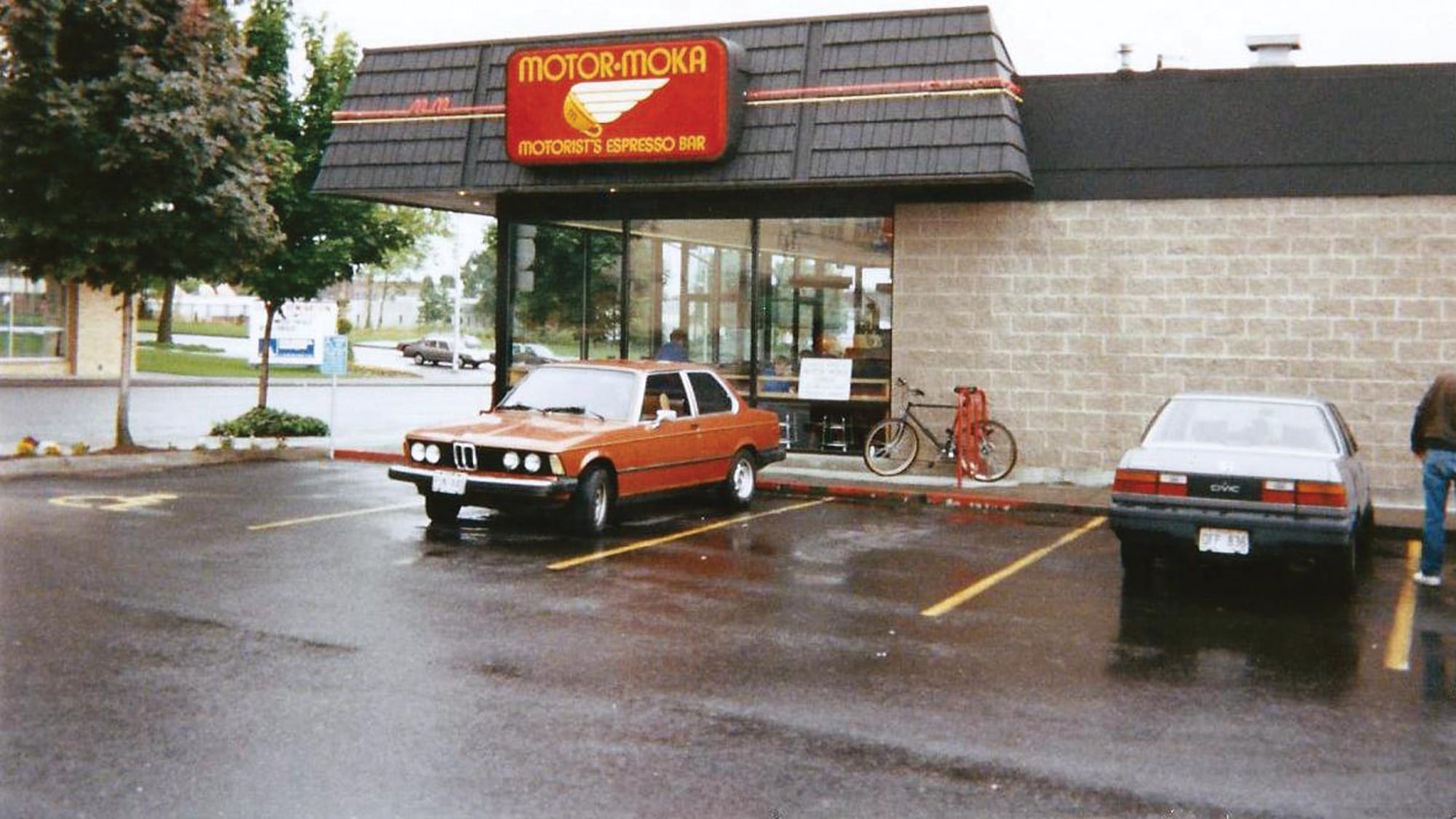In retrospect, drive-thru coffee seems obvious. These days, if a Starbucks or Dutch Bros. doesn't have a drive-thru, you're pissed you have to get out of your car. But 27 years ago, when Coffee People co-founder Jim Roberts launched the world's first drive-thru coffeehouse, across the street from the brand-new Oregon Convention Center, no one had seen anything like it.
At the dawn of the '90s, America had only just begun to recognize coffee as a beverage to be appreciated rather than a medicine to be administered, but proponents were still largely beholden to Old World cafe culture. Motor Moka, the "motorist's espresso bar," confounded all expectations. "The first day," Roberts tells WW, "we were out there filming the very first customer, and this guy comes through and asks for a hot dog. He didn't know what we were. He had no idea. He just wanted a hot dog."
Within a scant six years, Motor Moka had its own radio station, its own poetry journal, and about a dozen locations all over Portland—and just as quickly it folded, after a failed national expansion caused Roberts' Coffee People to implode. Starbucks bought every existing Oregon location outside the airport—including the flagship on Northeast Grand Avenue now popular with police officers.
But 27 years after it all began, Roberts says he's scouting locations to bring it back. We spoke with the Motor Moka visionary about the unlikely birth of the coffee drive-thru in Portland.
WW: How'd you get the idea?
Jim Roberts: I can remember specifically what provoked me. We had a store in a kind of food mall called Holladay's Market on Northeast Weidler, and I used to watch customers park in heavy rain, get out of their car, walk through the lot, stand in line to order, finally get to pay, stand in line again to pick up their drink, walk out the door through the parking lot in the rain, and try to open their door and get in the car. People just want that cup of coffee, you know? The principle was, the next person who makes it easier to get that cup of coffee is going to get a lot of business. So, that's why we did it.

I don't know anybody else that was doing it at that time. Look at it this way: McDonald's probably sold a cup of coffee in their drive-thru, but they weren't really focused on coffee.
How'd you come up with the name?
We wanted something with two M's. I was friends with the Macheezmo Mouse people, and just liked the sound. Macheezmo Mouse. Marilyn Monroe. I was a poetry major in college and felt the words "Motor Moka" had a kind of rhythmic beauty.
I remember sitting underneath a Shell gas station sign, looking up at that beautiful shell up against a red background, and thought we needed a picture like that, so we made this logo—a cup that had a wing coming out of its back in red, yellow, and white on a big orange sign.

Red, yellow, orange and white. When I was a teenager, I worked at McDonald's, and I've always thought there was a magic in those colors. To tell you the truth, I really wanted Motor Moka to look like fast food. I mean, it is fast food. It's fast coffee, and coffee's food. It was excellent coffee, the very finest we could make, but it was fast.

Was this much of a risk?
It was a big jump, but within our limitations. In summer of 1990, we found a Dunkin' Donuts on Grand Avenue that had gone broke. Initially, we only signed a one-year lease in case it wasn't going to work, but it did. It worked quite well. Eventually, people did find out that they could get coffee, and it ended up doing the business of a comparable McDonald's.
How many Motor Mokas were there at the peak?
Let's see, there was one on Martin Luther King Jr. Boulevard, there was one on Weidler, and the original one was 525 NE Grand—across the street from the old Sears building, which became the Convention Center pretty much when we started. It took up an entire block between MLK and Grand. That was probably our biggest drive-thru. We ended up leasing properties from this chain called Hot 'n Now and opened up several drive-thrus from Gresham all the way out to Hillsboro. They were scattered around, but I'm going to say 10, 15, something like that—mostly the ones we'd bought from Hot 'n Now.
There was another local chain here called Spunky's Hamburgers, and we also turned a few of them into coffee places. It's funny—when we first took over the Spunky's, we needed to operate them as hamburger stands for some reason I cannot recall. We kept the staff, and we didn't have to train them until they needed to do coffee. It wasn't a slow transition. We did hamburgers and Pepsi up until the given day, and, then, overnight it became a coffee place. This was in the middle of the Jack in the Box E. coli scare, so we were extremely careful with those hamburgers for a couple of months before we finally got to convert them into coffee.
Motor Moka had its own radio station?
Yeah, that was fun. We had a radio station called K-MOKA—just a lot of short funny skits that ran all the time. It was broadcast from the top of the building. You could hear it a few blocks from us. It was just something to listen to while you were waiting in line, but we had some really good, funny material. It reminded me of Firesign Theater. I cannot remember the name of these crazy comedians that made it up for us. Those guys did such a great job. I wanted to sell their product, put it on CDs or something, but that didn't ever work out.

And there was a poetry magazine?
I was in the MFA program at Oregon, and poetry was something I'd grown up really loving. So, we started a little poetry magazine called Mokas Ascending—kind of a takeoff on a piece of music called Larks Ascending—and customers sent in their poems. About coffee, usually.
Was Starbucks big competition when it opened its drive-thrus?
For a while after we opened, Starbucks was against drive-thrus. They said it was because they had built this culture around the coffeehouse experience, and they didn't see how people could have the coffeehouse experience inside their Buick.
So, they wouldn't do it, but I used to see a lot of big cars with Washington license plates pull up [to Motor Moka] and take pictures. And then, they did it. They hired away our first manager and opened their first drive-thru here in Portland. I never considered it hostile. I mean, it's been a lot of fun competing with Starbucks. We still consider ourselves competing, even though they've got, what, 26,000 stores and we have four right now.
Was the playing field more level back then?
Well, they were always bigger. When they came to town in '87, Howard Schultz, the CEO, came into my shop and said, "I just want you to know, we're not going to hurt you a bit." I didn't believe him at the time, but the truth is that they didn't hurt us. It was just fine.

What finally happened to Motor Moka?
As Coffee People got bigger, we became more of a…well-organized company, you might say, and I had business people helping me. They thought it was crazy to have two separate brands, and so we changed it back to Coffee People. I brought in MBAs to help me run the company, and they did things differently. In retrospect, I sometimes think I should've perhaps trusted my instincts a little more.
Coffee People had grown quite a bit from when Patty and I started it in 1983. We had a public offering in '96 and expanded out across the country but found that our stores weren't ramping up fast enough. In '98, there was a reverse merger. We became a division of a Canadian company called Second Cup, and that's when I resigned. I don't have any regrets, but I have lessons. Throughout life, we've always got lots of lessons, and y'know, I got a hundred of them. I'm not going into all of them, but I'm not sure I would do it the same way again. We all learn as we go along. I know I try.
What's the future for Motor Moka?
We have a Motor Moka coffee that we sell, and we're looking at locations right now for a new Motor Moka drive-thru.

People do seem to miss it.
There was a sense of community among our customers. We gave out stickers called "Black Tiger Dawn Patrol" with numbers on them, and people would put those on their windshields. One time, a young woman came dressed in a formal outfit and brought her kitchen chair to sit near the drive-thru sign and play the accordion. She didn't have a hat or anything. She wasn't asking for donations. She was just playing the accordion for customers as they went through.
Fancy people would come through, and a lot of the time, unfancy people would come through. We were looking for a wide variety of people. Sometimes, one of the Trail Blazers' players would come through and our staff would get excited. Al Roker from the Today show came through. We'd get celebrities. You know the pay-it-forward sort of thing? Where people would pay for the drinks of other customers? They'd buy their own drink and then say they would buy for the guy behind them, and that would go on and on and on.
Just like in any good place, there was a sense of community, which still amazes me because…I mean, it was a drive-thru.

